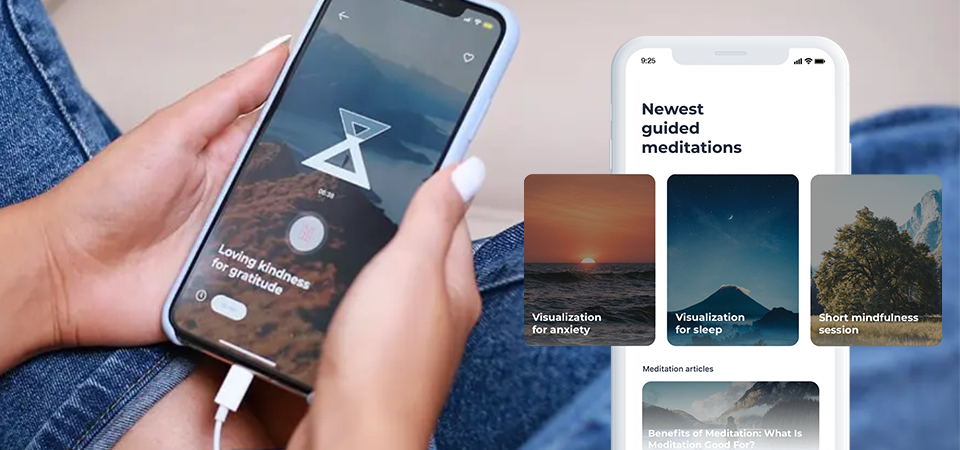When I was struggling through my final exams in graduate school, I remember sitting in the library at 2 AM, surrounded by empty coffee cups and feeling like my chest was going to explode from stress. That's when I realized I needed to find the best stress tools students could actually use – not just generic advice, but practical resources that work in the chaos of student life. After years of testing different approaches and talking with countless stressed-out students, I've discovered that the right combination of tools can transform how you handle academic pressure without requiring you to overhaul your entire routine.
Digital Apps That Actually Make a Difference
Let me start with what I consider the most accessible category of stress management tools: smartphone apps. Since you're already carrying your phone everywhere, these tools are always within reach when stress hits during study sessions or before big presentations.
Declutter The Mind

I have to put this meditation app first because it genuinely changed how I approach stress as a student. Unlike other meditation apps that can feel overwhelming with too many options, Declutter The Mind focuses on practical, short sessions that fit perfectly into a student's unpredictable schedule. The anxiety meditations are particularly effective when you're feeling overwhelmed before exams, and the focus sessions help tremendously when your mind is scattered across multiple assignments.
What I love most is that you can do a meaningful session in just 5-10 minutes between classes. The app includes specific content for studying stress and sleep issues, which are two of the biggest challenges students face. The guided meditations feel conversational rather than overly spiritual, making them approachable even if you've never meditated before.
Forest (Focus and Productivity)
This app gamifies focus time by letting you plant virtual trees that grow while you stay away from your phone. It's surprisingly effective for managing the stress that comes from constant distractions and social media scrolling. When you successfully focus for your set time period, you earn coins to plant real trees through their partnership with environmental organizations.
I've found Forest particularly helpful during intensive study sessions when the temptation to check social media becomes a source of stress itself. The visual progress of your growing forest provides a satisfying sense of accomplishment that reduces the anxiety of wondering whether you're being productive enough.
Insight Timer (Free Meditation Library)
While this app has thousands of meditations, I recommend starting with their "Student Life" collection. The free version offers more than enough content, including sleep stories specifically designed for racing minds and quick breathing exercises you can do in bathroom stalls before presentations (yes, I've been there).
Physical Tools for Immediate Stress Relief
Sometimes you need something tangible when digital solutions aren't cutting it or when you can't use your phone in certain situations like exams or lectures.
Stress Balls and Fidget Tools
I used to think stress balls were just office gimmicks until I tried using one during a particularly difficult statistics class. The repetitive motion genuinely helps release physical tension, and having something to do with your hands can prevent that restless energy that builds up during long study sessions.
Fidget cubes, spinner rings, and even simple worry stones serve a similar purpose. They're small enough to carry in your pocket and silent enough to use during lectures without disturbing others. The key is finding something with a texture or motion that feels satisfying to you personally.
Essential Oil Rollers
These are incredibly practical for students because they're portable, affordable, and provide immediate aromatherapy benefits. Lavender for calming before sleep, peppermint for alertness during study sessions, and eucalyptus for when you're feeling overwhelmed and need to clear your head.
I keep a lavender roller in my backpack and apply it to my wrists before stressful situations like presentations or difficult conversations with professors. The ritual itself becomes calming, and the scent provides a consistent anchor you can rely on.
Blue Light Blocking Glasses
While these might seem like just another tech accessory, they're actually powerful stress management tools for students who spend hours staring at screens. Poor sleep from blue light exposure creates a cascade of stress the next day, making everything feel more overwhelming than it actually is.
I noticed a significant improvement in both my sleep quality and next-day stress levels when I started wearing these during evening study sessions. Better sleep directly translates to better stress resilience during challenging academic days.
Breathing and Mindfulness Tools
Learning to manage your breath is like having a reset button for your nervous system. These tools help you develop that skill without requiring extensive training or perfect conditions.
Breathing Exercise Apps and Timers
The 4-7-8 breathing timer and box breathing visualizer are particularly effective for students because they provide structure when your mind is too scattered to remember breathing patterns on your own. I use the 4-7-8 technique before exams because it activates your parasympathetic nervous system, literally telling your body to calm down.
The box breathing visualizer is perfect for moments when you need to center yourself quickly between classes or before entering a stressful situation. Having a visual guide prevents your mind from wandering and makes the practice more effective in shorter time periods.
Guided Imagery Resources
When traditional breathing exercises feel too simple for your level of stress, guided imagery provides a more immersive way to reset your mental state. This technique involves following detailed mental scenes that guide your imagination away from stressful thoughts and toward calming environments.
I've found guided imagery particularly helpful for processing the emotional stress of academic challenges, not just the immediate physical tension. It's like giving your mind a mini-vacation when you can't actually take time off from your responsibilities.
Organization and Planning Tools
Much of student stress comes from feeling overwhelmed by competing deadlines and responsibilities. The right organizational tools don't just help you manage tasks – they provide psychological relief by creating a sense of control over your academic chaos.
Digital Planning Apps
Google Calendar combined with a task management app like Todoist or Any.do creates a comprehensive system for managing academic stress. The key is setting up your system to show you what you need to do today without overwhelming you with everything due this semester.
I recommend color-coding different types of commitments (classes, assignments, personal time, etc.) and setting up automated reminders that give you enough time to prepare without creating last-minute panic. The visual representation of your schedule helps reduce the mental energy spent trying to remember everything.
Physical Planners and Bullet Journals
Despite living in a digital world, many students find that writing things down by hand provides better stress relief than digital planning. The physical act of writing engages different parts of your brain and can feel more satisfying than typing on a screen.
Bullet journaling, in particular, combines planning with mindfulness. The ritualistic aspects of setting up pages and checking off completed tasks provide small moments of calm throughout stressful days. You don't need an elaborate system – even a simple daily task list with space for reflection can significantly impact your stress levels.
Social and Environmental Support Tools
Sometimes the best stress management tools aren't apps or gadgets – they're changes to your environment and social connections that reduce stress at its source.
Study Group Apps and Platforms
Discord servers dedicated to your field of study, StudyBlr communities on Tumblr, or even simple GroupMe chats with classmates can transform academic stress from an isolating experience into a shared challenge. When you realize other students are struggling with the same concepts or feeling the same pressure, your individual stress often decreases dramatically.
The key is finding communities that maintain a balance between venting about stress and actually working toward solutions. Look for groups that share resources, offer encouragement, and maintain reasonable boundaries around negative conversations.
Noise-Canceling Headphones and Sound Apps
Environmental stressors like noisy dorms, construction sounds, or even the general chaos of campus life contribute significantly to overall stress levels. Quality noise-canceling headphones paired with focus-enhancing sounds can create a portable sanctuary wherever you need to study or decompress.
Ambient sounds like rain, ocean waves, or coffee shop chatter can mask distracting noises while creating a consistent auditory environment that signals to your brain it's time to focus. Many students find that having the same background sounds for studying creates a Pavlovian response that makes it easier to enter a focused, less stressed state of mind.
Campus Resources and Apps
Most universities offer counseling services, stress management workshops, and wellness programs, but students often don't know how to access them efficiently. Many schools now have apps that consolidate these resources, making it easier to book counseling appointments, find study spaces, or join stress management groups.
Don't overlook practical campus resources like quiet study floors in the library, meditation rooms in student centers, or even just knowing where to find the most comfortable seating areas. Sometimes stress management is as simple as having a go-to space where you know you can decompress between classes.
Building Your Personal Stress Management Toolkit
The most effective approach to student stress management isn't using every tool available – it's finding the specific combination that works for your lifestyle, personality, and types of stressors. I recommend starting with one tool from each category and gradually building your toolkit based on what you actually use consistently.
Begin with meditation or breathing exercises since these cost nothing and can be used anywhere. Add one physical tool that appeals to you, whether that's a stress ball, essential oils, or blue light blocking glasses. Then incorporate organizational tools that address your specific sources of academic stress.
Remember that different tools work better for different types of stress. Quick breathing exercises are perfect for immediate anxiety relief, while longer relaxation sessions help with the chronic tension that builds up over weeks of academic pressure. Physical tools work well when you need something tangible to focus on, while digital apps provide consistency and guidance when your stress feels too overwhelming to manage alone.
The goal isn't to eliminate stress entirely – that's impossible and probably not even desirable since some stress motivates performance. Instead, these tools help you manage stress at levels that enhance rather than hinder your academic success. When you have reliable methods for returning to a calm, focused state, academic challenges become more manageable, and you can approach your education from a place of confidence rather than constant anxiety.
Most importantly, be patient with yourself as you experiment with different approaches. What works for your roommate might not work for you, and what works during midterms might need adjustment during finals week. The best stress tools students can use are the ones they'll actually reach for when they need them most, so focus on building habits around tools that feel sustainable for your specific situation and academic goals.







